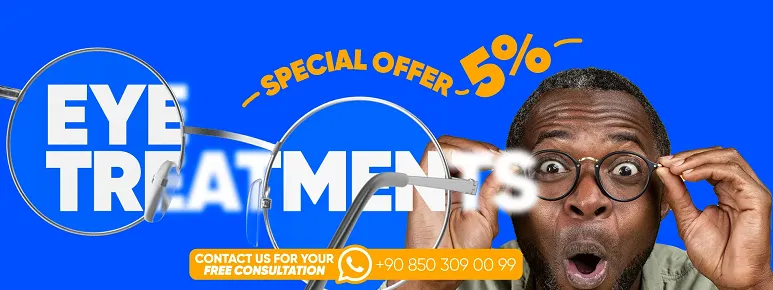Eye Treatments in Turkey
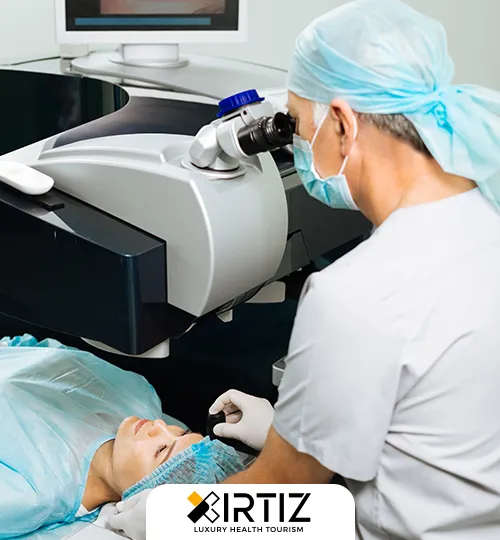
Femto LASIK Treatment
Femto Lasik Eye Treatment and Cost in Turkey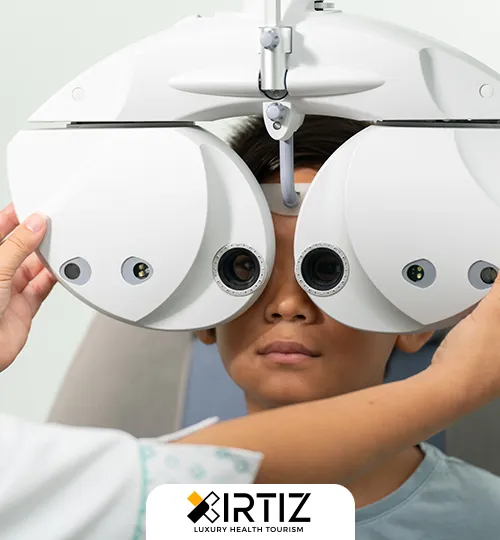
ILASIK Treatment
Ilasik Eye Treatment and Cost in Turkey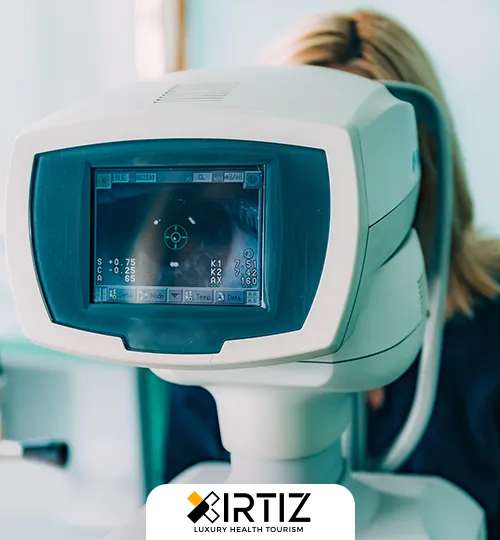
Lasik - PRK - LASEK
Treatment
Lasik Prk Lasek Eye Treatment and Cost in Turkey
Multifocal Trifocal Lenses Treatment
Multifocal Trifocal Lenses Eye Treatment and Cost in Turkey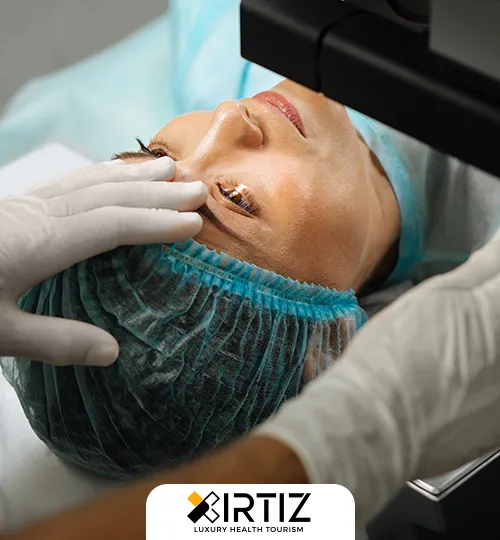
Cataract Treatment
Cataract Eye Treatments and Cost in Turkey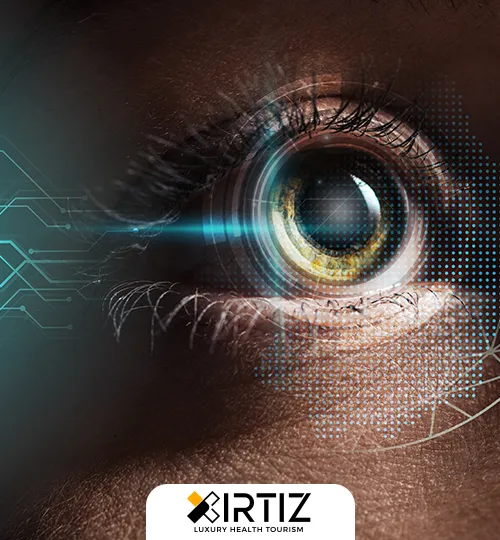
Relex Smile
Treatment
Eye Treatments in Turkey With Relex Smile TechniqueOphthalmological Diseases
Our eyes have a very small place in our body, but they are one of the most important organs. Most of the information in our daily life comes through our eyes. Therefore, eye health is very closely related to our body health.
Eye examinations should be performed periodically in early infancy, childhood and adulthood. Currently, babies need to have eye examinations at 2 months, 6 months and 12 months. Even if there is no problem, the examinations should be repeated regularly every year.
With Xirtiz Luxury Health, examinations and surgeries; Refractive Surgery, Cataract Surgery, Glaucoma, Cornea, Uvea-Retina, Vitreous Surgery, Strabismus, Neuro-Ophthalmology, Oculoplastics and Contact Lenses are performed by experienced doctors using the most modern research and research equipment.
We offer you the most modern techniques and equipment and experienced doctors for all eye surgeries.
Cataract surgery: Following a thorough eye examination and diagnosis of "cataract," an appointment is made for a consultation with an ophthalmic surgeon. During this meeting, the patient's medical history is discussed, the eye's physical condition is assessed, and the patient's visual preferences are taken into consideration to choose and measure the appropriate intraocular lenses (IOLs).
Cataract surgery is done as an outpatient procedure with the use of local anesthesia. The procedure typically takes around 15-20 minutes, following which the patient is moved to a regular hospital room and remains under the care of the clinic's medical staff for a few more hours. The eye that was operated on is shielded with a protective covering before the patient can leave for home. Hospitalization is unnecessary since the surgery is minimally invasive and does not require it.
Glaucoma: It is a common eye disease that affects millions of people. It can lead to vision loss or even blindness if left untreated. This is a very serious disease. Since its symptoms are not very obvious, it is likely to be overlooked. It is possible to treat the disease after the diagnosis is made based on both laboratory tests and the clinical findings of the patient. Medicines are first used for this purpose. These drugs are in the form of drops. If the patient's field of vision deteriorates despite drug treatment, laser treatment and drug treatment are combined. If vision loss continues, surgical treatment is applied. This disease can usually be treated with surgical treatments and surgical techniques to reduce intraocular pressure.
Refraction (Refractive) Defects
Refractive errors that need to be corrected with glasses, contact lenses or refractive surgery are generally evaluated in four groups: Hypermetropia, Myopia, Astigmatism and Presbyopia.
Although hyperopia is mostly effective at short distances, it is not effective at long distances when its degree is high. This may cause strabismus in childhood. These patients have a low refractive index.
In contrast, the refractive index of myopia is high. Therefore, they can see very close. It affects the most distant areas. However, the glasses or contact lenses prescribed are usually for permanent use. Presbyopia is caused by myopia after a certain age. The cause of this disease is that the lens loses a large part of its ability. This happens depending on age. Astigmatism is theoretically a condition in which the refractive indices of the horizontal and vertical axis differ from each other. In practice, it causes visual disturbances.
All these visual impairments (refractive errors) are treated with glasses, contact lenses or laser methods.
Refractive Surgery
Refractive surgery is the name given to common surgeries applied to patients who have problems with near and distance vision and therefore use glasses or contact lenses. Refractive surgery is divided into two parts. The first is laser surgery and the second is intraocular lens implantation. Laser surgery must meet certain criteria. The patient must be at least 18 years old. It should not have risen above 0.50 last year. Corneal thickness must be above a certain level. Myopia up to -10, astigmatism up to -6 and hypermetropia up to +4 can be corrected as follows, ie. With laser treatment. Before laser surgery, the patient must undergo initial examinations. If no eye disease (diabetes, rheumatic diseases or a disease that causes corneal thinning such as caraconus) can be detected in these examinations, laser surgery can be performed safely. It is generally recommended that our young patients wear special IOLs during IOL surgery. In this section, intraocular lenses that are not suitable for laser surgery and whose number is too high (for example, over -10-myopic patients) can be implanted. In addition, in patients over the age of 50, both distance and near vision can be corrected by removing the natural lens and replacing it with a smart lens as in cataract surgery.
Excimer laser
Excimer laser is a method used to correct visual defects for the last 20 years. It is applied to the cornea layer of the eye. Briefly, the cornea layer of the eye is formed. There are two methods used here: Firstly, a layer is removed from the cornea (we can think of this as a protective layer), Excimer laser is used and then the layer is placed back in place. In the meantime, this layer is removed with a Femtosecond Laser (LASIK) called Intralase (grainless). In another method, PRK method (surface laser) is applied to thin or deformed patients whose cornea is not suitable for this operation. In this method, the layer above the eye is temporarily removed, Excimer laser is applied and a protective contact lens is placed in the eye. Contact lenses are removed after 3 days.
LASIK
The lower age limit for Lasik is 18 and the upper age limit is 65. In people over 18 years of age, it must be determined that the number has stopped. The criterion here is that there is no increase of more than half a number in the last 2 years. A detailed eye examination is performed when assessing the suitability of people applying for Lasik. Patients are evaluated in terms of general eye health. The presence of different eye diseases other than refractive error is investigated. It is important that the corneal layer is suitable in shape and thickness for Lasik. For this purpose, the cornea is examined with corneal topography and other detailed examinations. In which cases Lasik cannot be applied?
The presence of eye diseases such as cataract and glaucoma is an obstacle to Lasik surgery. Lasik is not recommended in some systemic diseases such as diabetes, some rheumatism and skin diseases, dry eye disease, corneal disease called keratoconus and thin cornea. In fact, people who are suitable for the Lasik method are people who do not need glasses, that is, people who do not have an eye disease other than refractive error. LASIK treatment can be performed up to minimum number 9 and maximum number 10 in myopes. Correction can be made up to 6 numbers in hypermetropia. However, maximum effectiveness can be achieved up to number 4. Astigmatism patients can also be corrected up to 6 numbers.
Our country is highly preferred for Lasik especially by patients living in European countries. In addition to technological equipment and experienced physicians, economic factors are also effective in this.
ILASIK
Ilasik surgery is the only vision correction treatment that uses the wavefront diagnostic tool to determine the unique characteristics of your eye. Each of your eyes is unique. This system creates a 3-dimensional map showing that all processes in your eye are illuminated except the corneal surface. Your doctor can use the individual mapping to personalise your treatment plan. This personal information is digitally transmitted to a laser that precisely shapes your cornea to improve your vision. After numbing the eye, the doctor prepares your cornea for the IntraLase procedure. The IntraLase method uses very small, high-precision pulses of laser light to create a corneal flap. The doctor then folds the flap backwards to realise vision correction. Once the LASIK flap is created and folded back, another advanced laser is used to gently shape the cornea to the desired curvature according to your unique map.
MULTIFOCAL TRILOCAL LENSES
This procedure usually takes 10 minutes per eye. Anaesthetic eye drops make the procedure painless. The eye is opened through a small incision at the edge of the cornea that does not require stitches.
The fibrous capsule of the lens behind the pupil is opened circularly and the lens is removed. The capsule then supports (attaches to) the artificial lens. Each patient receives a customised implant with a lifetime shelf life.
Each patient is fitted with an artificial lens suitable for their eye. These well-tolerated artificial crystalline lenses have a lifetime shelf life and are invisible to the eye.
The surgeon inserts a syringe into the eye through the micro-incision and places an artificial lens in the eye. The previously folded artificial lens unfolds inside the eye and the surgeon inserts it into the free lens capsule. Artificial lenses correct presbyopia and other existing visual impairments (myopia, farsightedness and astigmatism).
The laser eye surgery for lens replacement enables a painless and accurate dissection of the different layers of tissue in the eye. Therefore, it offers two benefits compared to manual technology: first, the accuracy of the lens replacement procedure is ensured as the multifocal lens can be precisely inserted in the eye, and second, it is deemed safe due to the more precise laser incisions as opposed to manual ones.
RELEX SMILE TREATMENT
It is used to correct myopia, myopic astigmatism, and a mix of the two conditions. The process is pain-free, involves minimal surgery, and lasts only a few minutes.
ReLEx® SMILE is the third iteration of refractive laser surgery, succeeding LASIK and PRK/LASEK techniques.
Appropriate for individuals experiencing dry eye symptoms.
The stability of the cornea is preserved.
Appropriate for individuals with slender corneas.
Patients with myopia up to -10 dptr can be corrected.
Brief duration of treatment and rapid recuperation.
Treatment of astigmatism is achievable.
30% reduction in corneal tissue loss with "Slit" technology - small cut on the cornea
Appropriate for athletes like boxers and divers.
The ReLEx smile method is a mild type of laser eye surgery.
XIRTIZ LUXURY HEALTH is dedicated to offering you top-notch treatment services.
Our group of specialists has extensive experience in this area and uses cutting-edge technology to deliver excellent outcomes.
As XIRTIZ LUXURY Health, we aim to help everyone feel confident . Our secure treatment procedure will ensure you feel calm during the entire process.
Choosing to have eye surgery can be a daunting decision, but our team is here to assist you throughout the entire process. We will give you all the necessary information to help you decide if it is the best choice for you.

 Free Consultation
Free Consultation



